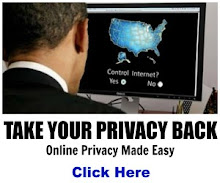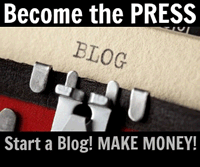Stephen Lendman
 |
| Image |
Free and open expression is our most fundamental right. Without it all others are endangered.
Candidate Obama promised transparency, accountability, and reform. He called sunlight “the best source of information about waste, fraud, and abuse.”
He said whistleblowing reflects “acts of courage and patriotism.”
“Often the best source of information about waste, fraud, and abuse in government is an existing employee committed to public integrity and willing to speak out.”
“We need to empower federal employees as watchdogs of wrongdoing and partners in performance.”
He pledged to “strengthen whistleblower laws to protect federal workers who expose waste, fraud, and abuse of authority in government.”
He said one thing. He did another. He usurped diktat powers. He wages war on truth. He targets whistleblowers. He threatens free expression.
Press freedom is endangered on his watch. He prioritizes surveillance powers.
They include warrantless wiretapping, accessing personal records, monitoring financial transactions, and tracking emails, Internet and cell phone use. It’s done lawlessly to gather secret evidence for prosecutions.
Obama wants truth and full disclosure suppressed. He wants whistleblowers silenced. He targeted more than all his predecessors combined.
Press freedoms are endangered. A new Committee to Protect Journalist (CPJ) report explains.
CPJ calls itself “an independent, nonprofit organization that promotes press freedom worldwide.”
It “defends the right of journalists to report the news without fear of reprisal.”
It “ensures the free flow of news and commentary by taking action wherever journalists are attacked, imprisoned, killed, kidnapped, threatened, censored, or harassed.”
It’s been operating since 1981. It publishes an annual global press freedom survey. It’s called “Attacks on the Press.”
Its new report headlined “The Obama Administration and the Press: Leak investigations and surveillance in post-9/11 America.”
Candidate Obama pledged open government. He fell woefully short. Journalists and press freedom advocates say he suppresses information people have a right to know.
He evades press scrutiny. He aggressively targets leakers. Electronic surveillance deters sources from speaking to journalists.
Restrictions began post-9/11. Obama exceeds the worst of George Bush. Interviews with dozens of fourth estate members explained.
Government officials are increasingly reluctant to come forward. Press freedom is gravely endangered.
Anyone suspected of disclosing information Obama officials want kept secret is targeted. They’re investigated. They’re given lie detector tests. Their telephone logs and emails are reviewed.
 An “Insider Threat Program” requires all federal employees to help prevent unauthorized leaks. It’s done by colleague monitoring.
An “Insider Threat Program” requires all federal employees to help prevent unauthorized leaks. It’s done by colleague monitoring.
Everybody is supposed to watch everyone else. Doing so is a whole new Big Brother notion.
It heightens paranoia. It makes government employees cautious about who they see and what they say.
Since 2009, six government employees, two contractors, and Edward Snowden faced criminal prosecutions. They were charged with leaking classified information to the press.
Other federal employees are being investigated. A climate of fear exists. Journalists and sources are reluctant to speak with each other.
They’re apprehensive about being watched. They fear repressive administration crackdowns.
According to Center for Public Integrity’s R. Jeffrey Smith:
“I worry now about calling somebody because the contact can be found out through a check of phone records or e-mails.”
“It leaves a digital trail that makes it easier for the government to monitor those contacts.”
New York Times reporter Scott Shane said he’s “scared to death (W)e have a real problem.”
“Most people are deterred by those leaks prosecutions. There’s a gray zone between classified and unclassified information.”
“(M)ost sources are in it. It’s having a deterrent effect.”
“If we consider aggressive press coverage of government activities being at the core of American democracy, this tips the balance heavily in favor of the government.”
Times correspondent David Sanger called the Obama administration “the most closed, control freak (one he) ever covered.”
According to CPJ, Obama’s “war on leaks and other efforts to control information are the most aggressive since” Nixon.
Thirty journalists interviewed agreed. Sources hesitate to discuss unclassified information. They’re unresponsive to press inquiries.
They fear leak investigations and government spying make it harder for reporters to protect them as sources.
Administration officials suppress information journalists need to do their job. They’re less able to hold the White House accountable for its policies.
Obama lied saying “(g)overnment should be transparent. (He claimed he) promotes accountability and provides information for citizens about what their government is doing.”
New York Times public editor Margaret Sullivan said his administration is “turning out (to reflect) unprecedented secrecy and…attacks on a free press.”
Obama “said default should be disclosure. The culture they’ve created” discourages it. White House officials deny what journalists call a culture of secrecy.
 According to AP senior managing editor Michael Oreskes:
According to AP senior managing editor Michael Oreskes:
“Sources are more jittery and more standoffish, not just in national security reporting. A lot of skittishness is at the more routine level.”
“The Obama administration has been extremely controlling and extremely resistant to journalistic intervention.”
“There’s a mind-set and approach that holds journalists at a greater distance.”
Washington Post reporter Rajiv Chandrasekaran said “one of the most pernicious effects is the chilling effect created across government on matters that are less sensitive but certainly in the public interest as a check on government and elected officials.”
“It serves to shield and obscure the business of government from necessary accountability.”
Bureaucratic bloat characterizes administration practice. In 2011, over four million Americans had security clearances.
Increasing amounts of information are classified as secret.
In 2011 alone, government employees made 92 million decisions on whether or not to classify information. Doing so is hugely overkill. Unauthorized disclosure is verboten.
Government employees revealing what the administration wants kept secret are targeted. So are journalists for reporting it. Doing so prevents them from doing their job.
According to Washington-based Financial Times correspondent Richard McGregor:
“Covering this White House is pretty miserable in terms of getting anything of substance to report on in what should be a much more open system.”
CBS Washington correspondent Bob Schieffer calls the Obama administration “the most manipulative and secretive (one he ever) covered.”
Bush administration officials were confrontational. E.W. Scripps Washington bureau chief Ellen Weiss calls the Obama administration “far worse.”
Veteran political journalists Jim VandeHei and Mike Allen described its message machine as follows:
“One authentically new technique pioneered by the Obama White House is government creation of content – photos of the president, videos of White House officials, blog posts written by Obama aides – which can then be instantly released to the masses through social media.”
“And they are obsessed with taking advantage of Twitter, Facebook, YouTube and every other social media forum, not just for campaigning, but governing.”
“They are more disciplined about cracking down on staff that leak, or reporters who write things they don’t like.”
Veteran ABC White House correspondent Ann Compton said:
 “There is no access to the daily business in the Oval Office, who the president meets with, who he gets advice from.”
“There is no access to the daily business in the Oval Office, who the president meets with, who he gets advice from.”
Important meetings aren’t even listed on his public schedule.
“In the past, we would often be called into the Roosevelt Room at the beginning of meetings to hear the president’s opening remarks and see who’s in the meeting, and then we could talk to some of them outside on the driveway afterward.”
“This president has wiped all that coverage off the map. He’s the least transparent of the seven presidents I’ve covered in terms of how he does his daily business.”
Reporters complain about questions they ask going unanswered. Interview requests are denied.
Atlantic Media Washington correspondent Josh Meyer said he experiences “across-the board hostility.”
“They don’t return repeated phone calls and emails. They feel entitled to and expect supportive media coverage.”
They complain about reports they don’t like. “If a story is (something) they don’t want to come out, they won’t even give you the basic facts,” said Politico’s Josh Gerstein.
The Obama administration takes information control to a whole new level. Aggressively targeting whistleblowers and reporters compromises free expression.
Bradley Manning’s prosecution was a turning point. So was targeting Edward Snowden.
CPJ cited numerous examples of government subpoenas demanding information sources give journalists.
It discussed sweeping NSA spying. Washington Post national security reporter Dana Priest said:
“People think they’re looking at reporters’ records. I’m writing fewer things in email. I’m even afraid to tell officials what I want to talk about because it’s all going into one giant computer.”
CPJ expressed great concern saying:
It’s “disturbed that the Obama administration has chilled the flow of information on issues of great public interest, including on matters of national security.”
“The administration’s war on leaks to the press though the use of secret subpoenas against news organizations, its assertion through prosecution that leaking classified documents to the press is espionage or aiding the enemy; and its increased limitations on access to information that is in the public interest – all thwart a free and open discussion necessary to a democracy.”
CPJ executive director Joel Simon sent its report to the White House. He requested a meeting to discuss it.
“Here you have a portion of the Washington press corp affirming that this is an extraordinarily difficult administration to cover,” he said.
“You combine the different elements, for instance, the leak investigations, the failure to address the declassification issue, the fact that the administration has been extremely controlling in terms of access.”
“Put all these together, and it paints a pretty damning picture of an administration that talks about openness and transparency but isn’t willing to engage with the media around these issues.”
Bush administration officials mostly raised concerns. At times they threatened. Doing so was largely posturing.
The Obama administration wages war on whistleblowers. It targets journalists for doing their job.
Doing so reflects the most draconian crackdown on press freedom in US history. It’s the new normal.
Police states operate that way. Obama heads the worst of rogue governance. He threatens fundamental freedoms in the process.
Stephen Lendman lives in Chicago and can be reached at lendmanstephen@sbcglobal.net. His new book is titled How Wall Street Fleeces America: Privatized Banking, Government Collusion and Class War Also visit his blog site at sjlendman.blogspot.com and listen to cutting-edge discussions with distinguished guests on the Progressive Radio News Hour on the Progressive Radio Network Thursdays at 10AM US Central time and Saturdays and Sundays at noon. All programs are archived for easy listening. http://www.progressiveradionetwork.com/the-progressive-news-hour/


Be the first to comment on "Obama’s War on Press Freedom"